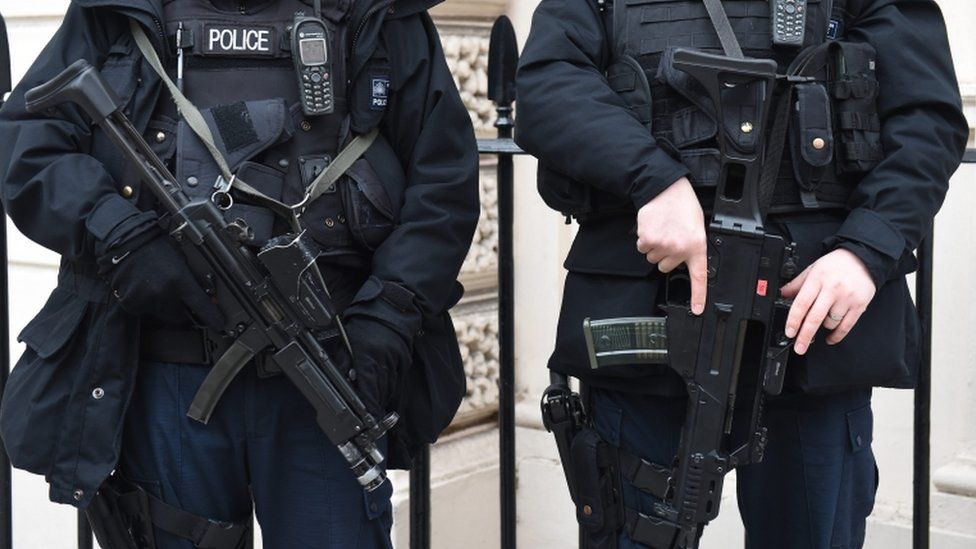EU referendum: Brussels attacks spark UK security debate
- Published

The Brussels terror attacks have heightened the intensity of debate over whether the UK would be safer in or out of the EU, ahead of the referendum.
Former MI6 head Sir Richard Dearlove said EU-based security bodies were of "little consequence" and that leaving the EU could boost Britain's security.
But Europol chief Rob Wainwright said the argument "doesn't stand scrutiny", saying intelligence sharing was vital.
The in-out referendum on the UK's membership of the EU is on 23 June.
Security has been a key argument in the debate so far, with In campaigners saying being in the EU makes the UK safer and Out campaigners arguing the opposite.
Earlier this week, UKIP leader Nigel Farage was criticised for saying EU border rules led to "the free movement of terrorists, of criminal gangs and of Kalashnikovs".
David Cameron said it was not "appropriate" to use the Brussels attacks to further arguments in the referendum debate, but Mr Farage said In campaigners had already "politicised" the security issue.
'Serious miscalculation'
Writing in Prospect magazine, Sir Richard - head of MI6 from 1999 to 2004 - argued that leaving the EU could strengthen Britain's security.
"Brexit would bring two potentially important security gains: the ability to dump the European Convention on Human Rights... and, more importantly, greater control over immigration from the European Union," he said.
He said it was better to conduct intelligence sharing on a bi-lateral basis, and argued that there would be no damage to the UK's close security ties with the US.
He also criticised Europol, the EU's law enforcement agency, saying the 28 members had "vastly varying levels of professionalism in intelligence" and its meetings must accommodate the "slowest and leakiest ship."
But speaking to BBC Radio 4's Today programme, its boss, Rob Wainwright, said police co-operation across the EU to fight terrorism and crime had improved considerably over the past decade - and that the UK had been a "driver" of that work.
"The scale and level of the integration the UK now has with its EU partners in this domain is considerable. I see the benefits of that for British police authorities everyday."
He said that as a part of the EU, the UK was able to take advantage of the European Arrest Warrant and had access to a network containing details of 300,000 wanted criminals and missing people.
"By making an argument that we would be better off by not having these arrangements at all I don't think stands much scrutiny," he told Today, adding that it was a "serious miscalculation".
'Access for terrorists'
Former head of GCHQ, Sir David Omand, has also entered the debate, saying the UK "would be the loser in security terms from Brexit not the gainer".
He said the "stronger security on the continent of Europe is, the safer we will be" and warned that leaving the EU would "jeopardise" intelligence sharing.
But pro-exit MP David Davis, former Conservative shadow home secretary, said it was "ridiculous" to suggest intelligence sharing would not continue if the UK left the EU, saying the UK "is the biggest, most powerful" intelligence operation in Europe.
But he added: "We mustn't overestimate the extent to intelligence co-operation is absolute. It never can be."
Mr Davis said some of the perpetrators of the Paris and Brussels terror attacks had been able to "move freely" throughout the EU which was "just one practical example of the damage done by the free movement of people to international security".
"Many of these killers... were EU citizens which means that even though we're outside Schengen we can't stop them coming to Britain," he added.
He also criticised EU plans for visa-free access for Turkish citizens - as part of a deal for Turkish help in tackling Europe's migration crisis - saying it will mean "we've opened up the access for terrorists".
The MP said leaving the EU would make "very little difference" to EU security but it would "strengthen" the UK's security.
- Published24 March 2016
- Published24 March 2016
- Published23 March 2016
- Published23 March 2016
- Published24 March 2016